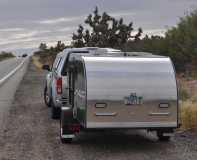Tire pressure?
38 posts
• Page 1 of 3 • 1, 2, 3
Tire pressure?
1700lb Ailiner Ascape. 13in wheels. 8ply rating. Original wheels/ tires.
First trip out and on Alberta frost heave roads I get a lot of bounce using factory 50lbs.
By a lot I mean stuff getting rearranged in rear cupboards and fridge.
Need to figure out something better.
Wondering what folks are carrying for air etc. Maybe go 14in wheels and passenger rated tires?
Heinz
Sent from my iPhone using Tapatalk Pro
First trip out and on Alberta frost heave roads I get a lot of bounce using factory 50lbs.
By a lot I mean stuff getting rearranged in rear cupboards and fridge.
Need to figure out something better.
Wondering what folks are carrying for air etc. Maybe go 14in wheels and passenger rated tires?
Heinz
Sent from my iPhone using Tapatalk Pro
- hwitten
- Teardrop Master
- Posts: 131
- Joined: Thu Feb 14, 2013 5:29 pm
- Location: Langley, BC, Canada
Re: Tire pressure?
We don't tow with a "full" weight load on the tires, but I never run under 45# on our 50# rated tires. Trailer tires are made to run fully inflated, not under-inflated. You will have excessive wear on the tires if they are soft, as well as excessive heat build up in summer weather.
If the suspension is too stiff, you might consider removing a leaf spring to soften the ride if it isn't a torsion axle. I recently went to a 3500# axle from a 2000# axle & it's a bit stiffer, but we've found it's better in general for our needs. There is a stiffer ride, but we run heavy enough that there isn't any real bounce on rougher roads, just a bit more shaking in the galley & some sorting of things in the shelves that wasn't there before when we stop.
The worst problem we've had with the new axle was a Blu-ray player coming loose on one really terrible road & hanging by its power cord to slam against the flat screen TV face most of the way home. Years ago the road to Parker Canyon Lake just south of Tucson was dirt, but paving might have actually made it worse! I wasn't sure how things were going to be after that. The screen's a bit buggered in a few places (pock marks along a line from the repeated bashing & pounding of the Blu-ray as it dangled by the power cord & swayed happily down the bad road), but it's still working well enough & the Blu-ray player is running like a champ. This is not an endorsement, but the Sony Blu-ray player & Samsung TV are both pretty rugged models with good durability and resistance to vibration & slamming. I don't recommend this type of testing for trailer electronics...
If the suspension is too stiff, you might consider removing a leaf spring to soften the ride if it isn't a torsion axle. I recently went to a 3500# axle from a 2000# axle & it's a bit stiffer, but we've found it's better in general for our needs. There is a stiffer ride, but we run heavy enough that there isn't any real bounce on rougher roads, just a bit more shaking in the galley & some sorting of things in the shelves that wasn't there before when we stop.
The worst problem we've had with the new axle was a Blu-ray player coming loose on one really terrible road & hanging by its power cord to slam against the flat screen TV face most of the way home. Years ago the road to Parker Canyon Lake just south of Tucson was dirt, but paving might have actually made it worse! I wasn't sure how things were going to be after that. The screen's a bit buggered in a few places (pock marks along a line from the repeated bashing & pounding of the Blu-ray as it dangled by the power cord & swayed happily down the bad road), but it's still working well enough & the Blu-ray player is running like a champ. This is not an endorsement, but the Sony Blu-ray player & Samsung TV are both pretty rugged models with good durability and resistance to vibration & slamming. I don't recommend this type of testing for trailer electronics...
Build log: viewtopic.php?f=50&t=60248
The time you spend planning is more important than the time you spend building.........

The time you spend planning is more important than the time you spend building.........
-

noseoil - 1000 Club

- Posts: 1822
- Images: 670
- Joined: Sun Apr 27, 2014 8:46 am
- Location: Raton, New Mexico, living the good life!





 Good comments. Under inflated tyres generate a lot of extra heat which can ultimately result in tyre failure. I don't carry a temp gun (would be nice to have though
Good comments. Under inflated tyres generate a lot of extra heat which can ultimately result in tyre failure. I don't carry a temp gun (would be nice to have though  ) but regularly give the tyres and hubs the touch test.
) but regularly give the tyres and hubs the touch test.